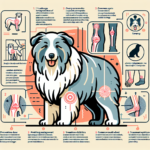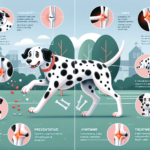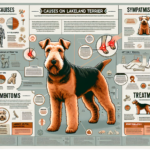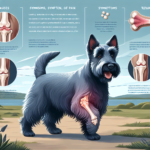Bearded Collie Joint Pain: Causes, Symptoms, Prevention, and Treatment

Introduction
The Bearded Collie, affectionately known as the “Beardie,” is a herding breed that originated in Scotland. Known for their distinctive shaggy coats and lively personalities, Bearded Collies have been cherished as both working dogs and family pets. Historically, they were used to herd sheep and cattle in the Scottish Highlands, a task that required agility, endurance, and intelligence. Today, they are celebrated for their friendly demeanor, high energy levels, and loyalty.
Like many purebred dogs, Bearded Collies are prone to certain health issues. Among these, joint pain is a significant concern that can affect their quality of life. Joint health is particularly crucial for Bearded Collies due to their active nature and the physical demands of their traditional herding roles. Ensuring good joint health can help maintain their mobility, comfort, and overall well-being.
Breed-Specific Joint Pain Risks
Genetic Predisposition
Bearded Collies, like many other breeds, have a genetic predisposition to joint-related issues. Common conditions include hip dysplasia, elbow dysplasia, and arthritis. Hip dysplasia occurs when the hip joint does not fit into the hip socket properly, leading to pain and mobility issues. Elbow dysplasia involves abnormal development of the elbow joint, which can cause lameness and discomfort. Arthritis, a degenerative joint disease, can develop as a result of these conditions or independently as the dog ages.
Age-Related Risks
As Bearded Collies age, the risk of joint pain increases. While young dogs may show early signs of joint issues, such as hip or elbow dysplasia, arthritis is more common in older dogs. Typically, signs of arthritis may begin to appear around the age of seven or eight, although this can vary. It’s essential for owners to monitor their Bearded Collies for any changes in mobility or behavior as they age.
Activity Level and Joint Stress
Bearded Collies are known for their high energy levels and need for regular exercise. While this activity is beneficial for their overall health, it can also contribute to joint stress, especially if the dog is involved in high-impact activities like agility training or herding. Repetitive stress on the joints can exacerbate existing conditions or lead to new joint issues. Therefore, it’s crucial to balance their activity levels to prevent overexertion.
Common Symptoms of Joint Pain in Bearded Collies
General Symptoms
- Limping or favoring one leg
- Stiffness, especially after rest
- Reluctance to climb stairs or jump
- Decreased activity or playfulness
- Visible discomfort or pain when moving
- Swelling around the joints
Breed-Specific Symptoms
In Bearded Collies, joint pain may manifest in specific ways due to their unique build and activity levels. Owners might notice a reluctance to engage in herding or agility activities, which they previously enjoyed. Additionally, the breed’s thick coat can sometimes mask swelling, making it essential to pay close attention to subtle changes in behavior and movement.
When to Consult a Vet
If you observe any of the above symptoms in your Bearded Collie, it’s crucial to consult a veterinarian promptly. Early diagnosis and intervention can significantly improve the prognosis and quality of life for dogs with joint pain. Regular veterinary check-ups are also essential for monitoring joint health and catching any issues early.
Preventive Measures for Joint Health
Exercise Recommendations
Regular, moderate exercise is vital for maintaining joint health in Bearded Collies. Activities such as walking, swimming, and controlled play can help keep their joints flexible and muscles strong without causing excessive stress. Avoid high-impact activities like jumping or running on hard surfaces, which can exacerbate joint issues.
Dietary Suggestions
A balanced diet rich in essential nutrients can support joint health. Consider incorporating foods or supplements that contain glucosamine, chondroitin, and omega-3 fatty acids, which are known to promote joint health. Always consult your veterinarian before adding supplements to your dog’s diet to ensure they are appropriate and safe.
Weight Management
Maintaining a healthy weight is crucial for reducing joint stress. Excess weight can exacerbate joint pain and lead to other health issues. Monitor your Bearded Collie’s weight and adjust their diet and exercise routine as needed to keep them at an optimal weight. Your veterinarian can provide specific guidelines based on your dog’s age, size, and activity level.
Early Screening and Monitoring
Regular veterinary check-ups and early screening for joint issues can help catch problems before they become severe. For Bearded Collies, screening for hip and elbow dysplasia is particularly important. Your veterinarian may recommend X-rays or other diagnostic tests to assess joint health and develop a preventive care plan.
Treatment Options for Joint Pain
Non-Surgical Treatments
Non-surgical treatments for joint pain in Bearded Collies include medications, physical therapy, and lifestyle adjustments. Anti-inflammatory drugs and pain relievers can help manage symptoms, while physical therapy can improve mobility and strengthen muscles around the joints. Lifestyle adjustments, such as providing a comfortable bed and avoiding high-impact activities, can also alleviate joint pain.
Surgical Options
In severe cases, surgical intervention may be necessary. Common surgeries for joint pain include hip replacement, arthroscopy, and joint fusion. These procedures can significantly improve mobility and reduce pain, but they come with risks and require a recovery period. Your veterinarian will discuss the best surgical options based on your dog’s specific condition and overall health.
Alternative Therapies
Alternative treatments like acupuncture, hydrotherapy, and massage can also benefit Bearded Collies with joint pain. Acupuncture can help reduce pain and inflammation, while hydrotherapy provides low-impact exercise that strengthens muscles without stressing the joints. Massage therapy can improve circulation and relieve muscle tension around the affected joints.
Lifestyle and Management Tips
Daily Care Routine
A consistent daily care routine can help manage joint pain in Bearded Collies. This routine might include gentle exercise, administering medications or supplements, and providing a comfortable resting area. Regular grooming is also essential to keep their coat in good condition and prevent matting, which can cause discomfort.
Modifying the Home Environment
Making your home more comfortable for a dog with joint pain can significantly improve their quality of life. Consider adding ramps to help them navigate stairs, providing orthopedic beds for better support, and using non-slip mats to prevent falls. Ensure their food and water bowls are at a comfortable height to reduce strain on their joints.
Long-Term Management
Long-term management of joint pain involves regular veterinary check-ups, ongoing monitoring of symptoms, and adjustments to their care routine as needed. Keeping your Bearded Collie active and engaged with low-impact activities can help maintain their mobility and mental well-being. Always consult your veterinarian for personalized advice and treatment plans.
FAQs About Bearded Collies and Joint Pain
What are the early signs of joint pain in Bearded Collies?
Early signs of joint pain include limping, stiffness, reluctance to move, and decreased activity levels. If you notice any of these symptoms, consult your veterinarian for a thorough evaluation.
Can joint pain in Bearded Collies be prevented?
While genetic predispositions cannot be entirely prevented, maintaining a healthy weight, providing regular exercise, and ensuring a balanced diet can help reduce the risk of joint pain. Early screening and monitoring are also crucial for catching issues early.
Are there specific exercises that are better for Bearded Collies with joint pain?
Low-impact exercises like walking, swimming, and controlled play are ideal for Bearded Collies with joint pain. Avoid high-impact activities that can stress the joints, such as jumping or running on hard surfaces.
What dietary supplements can help with joint health?
Supplements containing glucosamine, chondroitin, and omega-3 fatty acids are known to support joint health. Always consult your veterinarian before adding supplements to your dog’s diet to ensure they are appropriate and safe.
When should I consider surgery for my Bearded Collie’s joint pain?
Surgery is typically considered when non-surgical treatments are no longer effective, and the dog’s quality of life is significantly impacted. Your veterinarian will discuss the best surgical options based on your dog’s specific condition and overall health.
Conclusion
Joint pain is a common concern for Bearded Collies, but with proper care and preventive measures, it can be managed effectively. Regular exercise, a balanced diet, weight management, and early screening are crucial for maintaining joint health. If joint pain does develop, a combination of non-surgical treatments, surgical options, and alternative therapies can help alleviate symptoms and improve your dog’s quality of life. Always consult your veterinarian for personalized advice and treatment plans to ensure your Bearded Collie remains happy and active.




